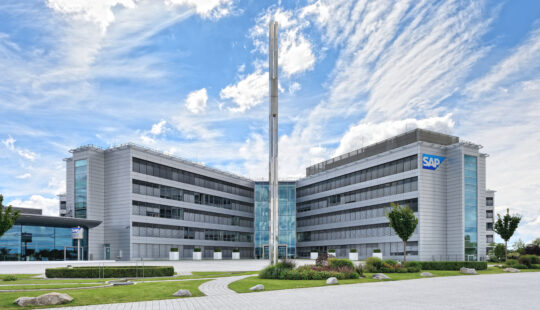Faced with many challenges together with complex local requirements and dissatisfied customers, this is the story of how SAP turned an inauspicious start in the West Balkan countries into a success.
“Patience, ingenuity, and a talent for improvisation were the qualities required to overcome the hurdles of being an ‘emerging country,’” says Dejan Banzić. He had already worked as a developer before joining SAP West Balkans in 2007 as a consultant. Alongside a local sales team, there were about 30 consultants working in various centers of expertise known as “hubs.”
“I was assigned to the Defense and Security Hub and began by attending six weeks of training in Walldorf with eight other colleagues from the team and with tremendous help of our experienced mentors from Germany.” Today he works as a project manager in the public sector industry.
Dušan Radošević, who joined the local sales team in 2008 as a delivery manager, had previously worked for international companies and for SAP partner S&T: “It was remarkable – and also a little strange – that only a few short years after the NATO bombing campaign, colleagues from Belgrade were working in an SAP competence center for defense and security.” In his case, too, it was enthusiasm for SAP software that had prompted him to make the move to SAP West Balkans.
In the aftermath of the global financial crisis of 2007 and 2008, SAP West Balkans hit a rough patch. An inter-company loan from SAP AG to bridge the gap seemed the only option. So Tatjana Filipović traveled to Walldorf in 2008 and was given the green light for a cash injection aimed at getting the subsidiary back on track. The loan was repaid quickly.
“SAP showed patience and continued to support our activities in the region, despite the fact that revenues were initially not what they should have been,” says Đorđe Talević, who was head of Marketing at the time.
SAP as an Employer
Another problem was how to attract and retain employees. Wolfgang Kastenhofer recalls that it was difficult to recruit consultants in the early days. “We either had to train our local consultants ourselves or headhunt consultants from partners, which we obviously didn’t want to do, as that could have jeopardized our existing license business.”
In 2008, SAP had to cut its workforce from 43 to 30. Wolfgang Runge says: “Even during the financial crisis, SAP consulting business was booming and SAP consulting partners were springing up all over the place. Many of the employees who acquired SAP know-how while working for us made the jump to Western Europe and were welcomed with open arms in Germany and Europe, and in the United States as well.”
This meant that most of the consultants SAP West Balkans had to let go in 2008, found new positions within SAP. “Having SAP knowledge meant that you could find work in other SAP locations or as a freelancer, which gave us consultants a feeling of security and flexibility that you simply didn’t have in other companies,” says Dubravka Živančev, now a senior project manager for Public Sector.
Headcount remained relatively stable in Serbia in the years that followed, though turnover continued to run at fairly high levels. “Of the 30 consultants who joined SAP West Balkans when I did, only five are still there. Many transferred within SAP. But fortunately, as time went on, it became easier to recruit qualified and experienced people,” says Banzić.
“The CEE countries had excellent universities, and some of the applicants from them had received much better IT training than our young students from Germany, Austria, and Switzerland,” explains Runge.
He emphasizes SAP’s positive role, saying that there was nothing it could have done to halt high employee turnover: “Back then, it was simply the case that the other countries offered these skilled workers more opportunities.” As time went on, SAP opened development centers in many locations and then had the structures in place to offer skilled IT personnel more interesting jobs in their own countries.
For Živančev, SAP’s international focus was not just reflected in the opportunities that were available to leave the region, but also in the business culture at local level: “My friends found it hard to believe in the early years when I told them I worked at the subsidiary of a German company, in close cooperation with Austria, had a Spanish manager who came to live in Belgrade, had team mates from Ukraine, and worked on projects in the U.K. or Slovenia. They thought I was telling fairytales when I said I started working with colleagues from Italy, India, Greece, Portugal, and other countries for a customer in Novi Sad – my hometown.”
Light at the End of the Tunnel
In 2008, the subsidiary moved to its new offices at 88 Omladinskih Brigada in “Airport City”, a state-of-the-art business park in Belgrade. The various areas of the company, which had previously been spread across the GTC Business Center and the Genex Tower on the other side of the city, could now come together.
Talević, originally a journalist based in Serbia, began organizing event and communications activities for SAP West Balkans in 2008, while working as a PR consultant for a third-party company, and took over the role of marketing manager in September 2009. When it came to conquering the market, says Talević, events such as SAP World Tour and SAP Forum were crucial and they became recognized as key IT business events. “Particularly because they were attended by guests from the other Balkan regions. Our customers were not just from Serbia. After Serbia, for example, Bosnia and Herzegovina was the country with the second largest number of SAP installations in the contractual territory.”
As SAP expanded, its organizational structures also changed: SAP West Balkans, by now assigned to the southern European business, became part of the Central and Eastern European (CEE) business region again in 2008. Vladimir Popović, who had previously overseen partner management in Southeast Europe out of SAP Austria, became managing director of SAP West Balkans in 2009, replacing Dragan Španović in that role.
For Belgrade-born Popović, this was an exciting challenge: “Despite all the difficulties, the important thing was always to focus on the big picture. Although, as a subsidiary, we clearly had to take a sales-oriented approach and quarterly figures were important, we could not afford to jeopardize long-term customer satisfaction. In short, we had to manage expectations, plan sensibly, and make realistic promises.”
After the failed start with oil and gas company NIS, it was important for SAP to reestablish basic trust in the company and its products. “SAP had the reputation of offering expensive software that didn’t actually work,” recalls Popović. “We had to tackle that view head on and highlight the basic strengths that characterize SAP: a great product that helps companies manage, analyze, and optimize their business effectively.”
An agreement was reached with NIS, which was sold to Russian energy company Gazprom in 2008. SAP took onboard the mistakes it had made in the original project and the partner recognized that its own input and cooperation were just as important to the project’s success as SAP’s. “Little by little, we transformed what began as a failed project into a success story,” says Popović.
The Turnaround
The next key project success for SAP West Balkans was in the public sector, where, with the support of Franz Zipp and SAP Austria, it won the City of Belgrade as a customer. “This project was a prime example of how, when you do SAP right, customer employees – at all levels of the company hierarchy – get to enjoy fantastic software,” says Popović.
Knowledge transfer from Austria was particularly crucial for this project, adds Živančev: “SAP has really good people: Career starters can learn a great deal from them.”
As more and more big names from industry and business approached Popović voluntarily and gave him positive reports about their SAP implementations, he knew that the tide would turn. “One of these influential managing directors said to me, ‘To begin with, I wasn’t sure whether I really needed SAP, but my company would not be what it is today if I hadn’t implemented it.’”
Popović remembers that, for one project, he asked the Austrian National Bank for a recommendation letter confirming that it had been a satisfied SAP customer since 1987. “That was pretty special — which other company could point to a customer that had been satisfied for 20 years?” he says.
For SAP West Balkans, it was important to have good managers and consultants on site who spoke the local language and were familiar with local customs and characteristics. But in the early days in particular, support from experienced SAP managers like Franz Zipp was indispensable. “Franz was instrumental in SAP’s upward trajectory in the West Balkan countries for many years, in roles including consulting lead and regional CFO,” says Runge.
Company Culture Built on Normality
Popović sees SAP’s strength as its people-centric approach, one that allows creative freedom and the flexibility for employees to make decisions that harmonize the drive to do business with the need to take local and ad-hoc situations into account: “The people of the Balkans region are very grateful when someone behaves ‘normally.’ By that I mean according to basic human values and needs, such as keeping promises and being able to rely on commitments made, dealing with difficulties together, and benefiting jointly from successes. That was not a given during wartime or even in the period thereafter. In the business world, too, people had forgotten how to trust each other.”
In the years that followed, SAP West Balkans managed to “change course.” Just five years after the global financial crisis, SAP had firmly established its position as the market leader in Serbia and the region.
“When you look at the difficult situation from which it emerged, SAP West Balkans’ progress is even more astonishing,” says Banzić. It is proof once again that personal commitment, cooperation, perseverance, and great leadership with the ability to wipe the strategic slate clean if necessary are the ingredients for success.
Today, there are some 50 employees at the head office in Belgrade and, following the acquisition of Callidus Cloud, the total workforce grew to almost 300 in October 2019. The Belgrade office of Callidus Cloud is one of the three largest in Europe. And, with it, SAP West Balkans now has its own development department to add to its sales and consulting departments. After moving together into new, prestigious offices the colleagues will provide the foundation for the next chapter of the SAP West Balkans success story.



